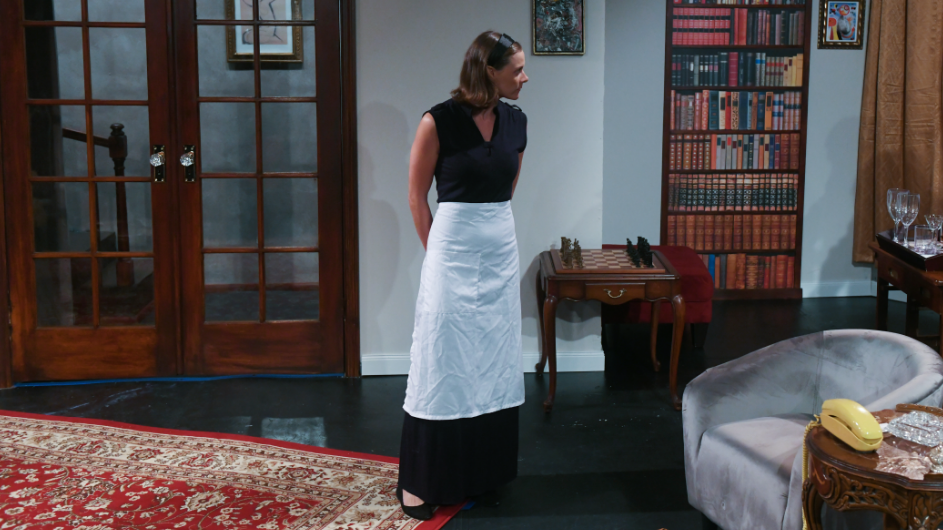Lights! Camera! Quantum! Theoretical Quantum Physicist by Day and Actor By Night: Postdoc Norah Hoffmann
Lights! Camera! Quantum! The theoretical quantum physicist by day and actor by night explains how she blends science and art.

Norah Hoffmann was born in the United States and raised in Europe. After studying physics as an undergraduate student at the Technical University of Berlin, she completed her PhD in theoretical quantum physics at the Max Planck Institute Hamburg, where she was co-advised by Neepa Maitra at Rutgers University. A temporary visit to the states became a permanent home this side of the Atlantic after she landed a postdoc position with Timothy Berkelbach in the chemistry department at Columbia University.
Now with a grant of her own and a guest scientist position with the Flatiron Institute, Hoffmann has been relishing her time in New York. "It's like the movies. Every time I come out of the subway at Columbia, 'I'm like, this is not real!’” she said.
New York is the place to be for a scientist-cum-actor. We asked Hoffmann about her research, her acting career, and what it’s like to be a woman in science.
What are you working on at Columbia?
I study light-matter interactions using a very cool tool called cavities. Cavities are two mirrors that trap a vacuum field between them. Technically we trap nothing, but in our case the cavities are so small that we have to take into account the quantum nature of the vacuum. Put a material in this type of cavity and it will react with so-called vacuum field fluctuations, which change chemical reactions.
If it works it’s basically a new way to do chemistry. It’s really exciting, but there are still so many unanswered questions. We’ve been doing very fundamental theoretical work and that takes a few years in one-dimensional space before you can actually alter reality, but we are on the way now.
You now work with the CCI Center for Chemistry with Electric Fields. How do theorists like yourself and experimentalists work together?
I think that process differs from project to project but in our case, we started in parallel. You both start out in the dark and then find the way out together. It’s so interesting to see something in their experiments that we can also see in our theories—a center like the CCI is perfect for connecting the two.
When you aren’t theorizing, you’re acting, Tell us about that.
I always had this thing between science and art. I moved to Berlin because that was the only city in Germany where one could do both. I studied physics during the day and went to a conservatory for performing arts in the evening.
Here in New York everything kicked off ... well, because it's New York! I've done short films, a few features, and theater. Then the pandemic hit. But luckily since last year, things have been coming back.
How do your two lives interact?
A. This might sound strange but for me, science is very much like art: in both, you’re trying to describe and create a world that doesn't exist (yet). I think science has a very creative component, and I feel I need both.
Many of my "scientific" ideas have happened when I was in a completely different setting. I've been in rehearsals and thought, "I need to put that in the computer tomorrow!" And then I’d write it down on the edge of a script. Many of my scripts have both equations and notes from the director in the margins!
The other way around, acting can be a harsh business. So much depends on your look, your height, the sound of your voice, and so on—things you can hardly control. It's nice to have a part of my life that only involves your brain, your computer, and a comfy couch.
Science is very much like art: in both, you’re trying to describe and create a world that doesn't exist (yet).
What has your experience been like as a woman in STEM?
A. I think the biggest problem was the feeling of not fitting in. Especially when I wouldn’t succeed at something, I’d often think, "Oh, that’s because you don’t fit and shouldn’t be here.” For me, that feeling was quite a barrier to overcome.
Over the years it's changed in a positive way. I see a lot more women in science and, while we’re for sure not at the end, we're on a good course. In my current group, we're almost 50/50 and in my experience the closer to 50/50, the better the environment.
Do you have any female STEM role models?
I am very lucky because my mother, who is a physician, fostered my interest in science from the beginning. I also had a female PhD co-advisor, Neepa Maitra from Rutgers University. She really has been such a huge inspiration for me through the years.
Any advice for future female scientists?
Take advice with a grain of salt. Especially for women in STEM, there is a chance that the old advice people are used to giving might not be the right advice for you.
Most importantly, if you feel science is a path for you, just go for it! Never let others tell you that you might not be the right fit for science because if you are interested in it, you are!